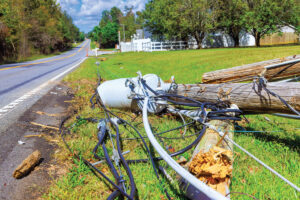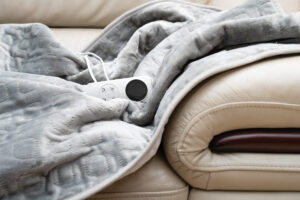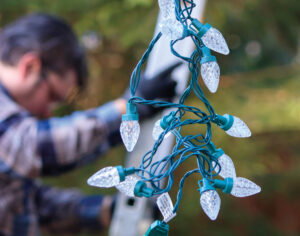 A summer storm can mean power outages during high temperatures, creating safety issues related to keeping cool. Take steps to be prepared for a prolonged outage during summer heat and know how to weather it safely. To get power restored as soon as possible, call your electric cooperative to report the outage.
A summer storm can mean power outages during high temperatures, creating safety issues related to keeping cool. Take steps to be prepared for a prolonged outage during summer heat and know how to weather it safely. To get power restored as soon as possible, call your electric cooperative to report the outage.
“High winds and lightning that accompany severe storms can be the cause of many summer power outages,” says Matt Eisenmenger, Safe Electricity advisory board member. “Tree limbs or debris may have downed a power line, and possibly hide electrical hazards due to storm damage. It’s important to stay clear of downed power lines at all times, even when cleaning up after the storm.”
In the immediate aftermath of a storm, assume that any dangling wires you encounter are electrical and treat all downed or hanging lines as if they are energized. If you are driving and come upon a downed power line, stay in your vehicle, warn others to stay away and contact emergency personnel or electric utility. Stop at all railroad crossings, and treat road intersections with non-functioning traffic signals as a four-way stop before proceeding with caution.
If power to your home is out for a prolonged period, know and understand important safety precautions and steps to cope with heat until power is restored:
■ Dress in loose, lightweight clothing and stay on the coolest, lowest level of your home.
■ Use natural ventilation to cool homes, and consider purchasing battery-powered fans.
■ Drink plenty of water and avoid heavy meals, caffeinated and alcoholic drinks.
■ Keep refrigerator or freezer doors closed. A freezer that is half full or full can keep foods frozen 24 to 48 hours. Foods should stay safe in an unopened refrigerator up to four hours. If an outage lasts longer than four hours, remove and pack meat, milk and other dairy products in a cooler with ice.
■ Use safe alternative food preparation methods like a barbecue grill. But, a grill should never be used indoors. Always grill outside.
■ Check on friends and relatives—especially children, seniors, and those with medical conditions or disabilities. These people may need to seek emergency cooling shelters.
■ Make sure you know how to open your automatic garage door by hand.
■ Close all drapes and blinds on the sunny side of your residence.
■ Take your family and pets to a cool basement location if you have one. Also consider going to an air-conditioned public place during warmer daytime hours.
During an outage, Safe Electricity recommends turning off electrical appliances and unplugging major equipment, including air conditioning units, computers and televisions. This will help protect equipment that could be damaged by electrical surges and prevent circuit overloads when power is restored. Leave one light on to indicate that power has been restored. Wait a few minutes then turn on other appliances and equipment one at a time.
If you use a standby generator, make sure a transfer safety switch is used, or connect the appliance(s) directly to the generator output through an extension cord or isolated circuit before you operate it. This prevents electricity from traveling back through the power lines, what’s known as “back feed.”
“Back feed creates danger for anyone near lines, particularly crews working to restore power,” says Eisenmenger.
For more tips on electrical safety, visit www.SafeElectricity.org.








